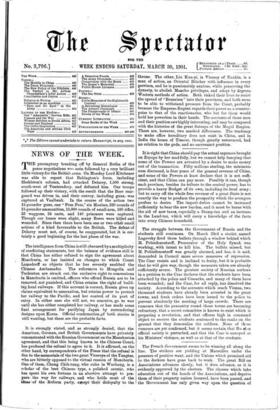It is strongly stated, and as strongly denied, that the
American, German, and British Governments have privately remonstrated with the Russian Government on the Manchuriam • agreement, and that this being known to the Chinese Court, has produced the refusal to agree to it. It is affirmed, on the other hand, by correspondents of the Times that the refusal ii due to the memorials of the two great Viceroys of the Yangtee, who are 'bitterly opposed to the virtual cession of Manchuria. One of them, Chang Chili-twig, who rules in Wuchang, is a scholar of the best Chinese type, a polishe4 ascetic, yho has spent his own fortune in an abortive attempt to pre- pare the way for railways, and who holds'most of the ideaa.of the -Reform party, erept' their disloyalty 'to the throne. The other, Liu Kun-yi, is Viceroy of Nankin, is a man of action, an Oriental Blucher with influence in every garrison, and he is passionately anxious, while preserving the dynasty, to abolish Manchu privileges, and adopt by degrees Western methods of action. Both risked their lives to resist the spread of "Boxerisra" into their provinces, and both seem to be able to withstand pressure from the Court, probably because the Empress-Regent regards their power as a counter- poise to that of the reactionaries, who but for them would hold her powerless in their hands. The accounts of these men and their position are highly interesting, and may be compared with the histories of the great Satraps of the Mogul Empire. There are, however, two marked differences. The tendency to make office hereditary does not exist in China, and in India the house of Timour, though greatly reverenced, had no relation to the gods, and no sacrosanct position.






































